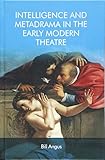Intelligence and Metadrama in the Early Modern Theatre / Bill Angus.
Material type: TextPublisher: Edinburgh : Edinburgh University Press, [2022]Copyright date: ©2018Description: 1 online resource (192 p.)Content type:
TextPublisher: Edinburgh : Edinburgh University Press, [2022]Copyright date: ©2018Description: 1 online resource (192 p.)Content type: - 9781474432917
- 9781474432931
- 822.309353
- online - DeGruyter
| Item type | Current library | Call number | URL | Status | Notes | Barcode | |
|---|---|---|---|---|---|---|---|
 eBook
eBook
|
Biblioteca "Angelicum" Pont. Univ. S.Tommaso d'Aquino Nuvola online | online - DeGruyter (Browse shelf(Opens below)) | Online access | Not for loan (Accesso limitato) | Accesso per gli utenti autorizzati / Access for authorized users | (dgr)9781474432931 |
Frontmatter -- Contents -- Acknowledgements -- Introduction: Errant Intelligence – The Devil’s Own -- 1 ‘Subtle sleights’: Amity and the Informer in Damon and Pithias -- 2 The Parasites of Machiavel -- 3 The Knight of the Burning Pestle and the Menace of the Audience -- 4 The Reluctant Informer: Humanising the Beast -- 5 Metadrama and the Murderous Nature of Authority -- 6 The Burning Issue: Metadrama and Contested Authority in Chettle’s Hoffman -- Conclusion: No One Is There – Ubiquity and Invisibility -- Index
restricted access online access with authorization star
http://purl.org/coar/access_right/c_16ec
Explores intrinsic connections between early modern intelligencers and metadrama in the plays of Shakespeare’s contemporariesIntelligence and Metadrama in the Early Modern Theatre offers insight into why the early modern stage abounds with informer and intelligencer figures. Analysing both the nature of intelligence at the time and the metadrama that such characters generate, Angus highlights the significance of intrigue and corruption to dramatic narrative and structure. His study of metadrama reveals some of the most fundamental questions being posed about the legitimacy of authority, authorship and audience interpretation in this seminal era of English drama.Key FeaturesOffers insight into the internal workings and motivations of the drama of Shakespeare’s contemporariesOpens a new window on the ambitions, concerns, and fears of these important authorsEnhances historical understanding of the place of the intelligencer in the society and the structures of authority within which the drama was produced
Mode of access: Internet via World Wide Web.
In English.
Description based on online resource; title from PDF title page (publisher's Web site, viewed 29. Jun 2022)


